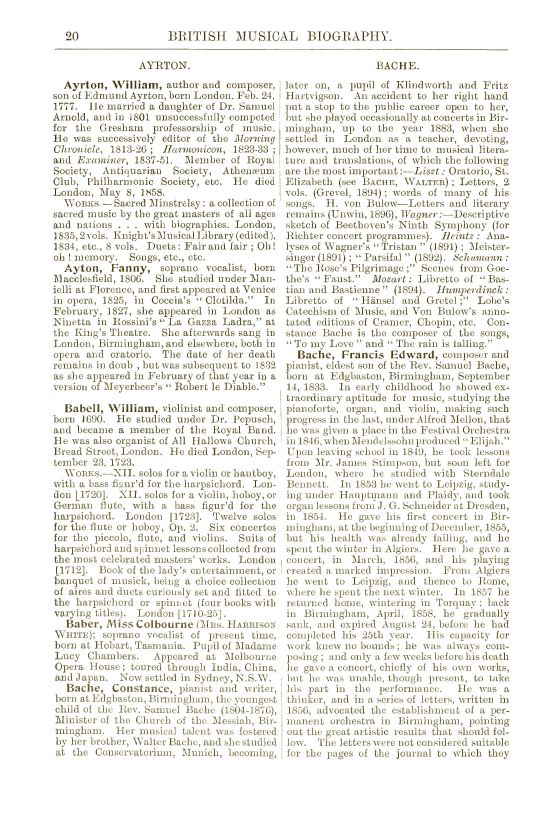- Bache, Francis Edward
[E] Bache, Francis Edward, composer and.
pianist, eldest son of the Rev. Samuel Bache,
born at Edgbaston, Birmingham, September
14, 1833. In early childhood he showed ex-
traordinary aptitude for music, studying the
pianoforte, organ, and violin, making such
progress in the last, under Alfred Mellon, that
he was given a place in the Festival Orchestra
in 1846, when Mendelssohn produced "Elijah."
Upon leaving school in 1849, he took lessons
from Mr. James Stimpson, but soon left for
London, where he studied with Sterndale
Bennett. In 1853 he went to Leipzig, study-
ing under Haujitmann and Plaidy, and took
organ lessons from J. G. Schneider at Dresden,
in 1854. He gave his first concert in Bir-
mingham, at the beginning of December, 1855,
but his health was already failing, and he
spent the winter in Algiers. Here he gave a
concert, in March, 1856, and his playing
created a marked impression. From Algiers
he went to Leipzig, and thence to Rome,
where he spent the next winter. In 1857 he
returned home, wintering in Torquay ; back
in Birmingham, April, 1858, he gradually
sank, and expired August 24, before he had.
completed his 25th year. His capacity for
work knew no bounds ; he was always com-
posing ; and only a few weeks before his death
he gave a concert, chiefly of his own works,
but he was unable, though present, to take
his part in the performance. He was a
thinker, and in a series of letters, written in
1856, advocated the establishment of a per-
manent orchestra in Birmingham, pointing
out the great artistic results that should fol-
low. The letters were not considered suitable
for the pages of the journal to which they
were addressed, and have only recently been
published, and that in connection with the
formation of the Scottish Orchestra at Glas-
gow, in 1893. His compositions must be
looked upon as the promise of what might
have been had he lived longer ; they prove,
however, that in Francis Edward Bache death
robbed England of a highly gifted artist.[W] Works. — Operas : Which is which (1851) ;
Rubezahl (1853). Orchestral : Overture (per-
formed, Adelphi Theatre, November, 1850) ;
Concerto for pianoforte and orchestra in E ;
Andante, Rondo, and Polonaise ; Morceau de
concert in F, for pf. and orchestra. Trio in D,
pf. and strings, Op. 28 ; Two Romances, violin
and pf. ; Romance in G, flute and pf. ; Romance
for pf . and 'cello. Op. 21. Pianoforte : Three Im-
promptus, Op. 1 ; Two Romances, Op. 12 ; Pour
Mazurkas, Op. 13 ; Five characteristic pieces.
Op. 15 ; Deux Polkas, Op. 17 ; Souvenirs
d'ltalie, eight pieces, Op 19; Les Clochettas
des traineau. Op. 20 ; La Penseroso e 1' Allegra,
Op. 24 ; Souvenirs de Torquay, five pieces. Op.
26 ; other pieces and transcriptions, more than
fifty in all. Introduction and Allegro, organ.
Six songs for voice and pf.. Op. 16 ; Litany,
words and music [1862] . Four songs [1859] ;
and single songs — the "Farewell " being worthy
to stand side by side with the lleder of Schu-
bert and Schumann.entry id: 20-R-26

page 20 - view at internet archive
